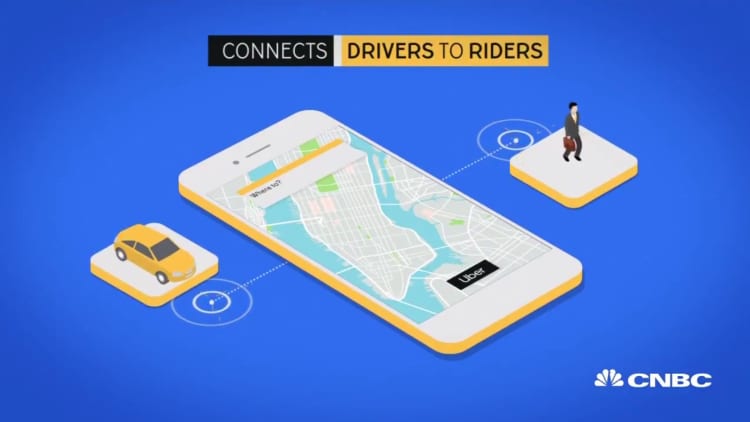Shares of Uber rose 9.5% Friday, a day after the company forecasted reaching a key profitability goal sooner than expected. The stock is on pace for its best day ever since debuting in May.
The move added $6 billion to Uber's market valuation, bringing it to $69.3 billion. During the trading day, it briefly went above the market cap it reached at the end of its first trading day, which was $69.7 billion.
In its fourth quarter 2019 earnings call Thursday, CEO Dara Khosrowshahi told analysts the company would move its EBITDA profitability target to Q4 2020, sooner than his previously stated goal of becoming profitable for the full year of 2021. The announcement sent Uber's stock up as much as 10% in after hours trading.
Uber reported accelerating revenue growth on an annualized basis of 37% up from 30% in the previous quarter. The company beat the Refinitiv consensus estimate of $4.06 billion in quarterly revenue, reporting $4.07 billion. It also reported a better-than-expected loss per share: 64 cents excluding items, compared with a 68 cent loss projected in the Refinitiv survey.
The company reported a net loss attributable to the company in 2019 of $8.51 billion, mainly due to stock-based compensation. It expects its losses to be less pronounced than analyst estimates for 2020. Uber forecasted a $1.35 billion loss at the middle range before interest, taxes, depreciation and amortization, lower than the FactSet analyst consensus of a $2.83 billion loss.
In notes Friday morning, analysts highlighted the new EBITDA profitability target, with many putting a buy or outperform rating on the stock. Analysts at MKM Partners, who upgraded the stock to a buy rating and moved their price target from $34 to $45, wrote that incremental margins on rides revenue have contributed to the accelerated profitability target.
"To date, we think Uber was being valued as if it is going out of business — either due to ongoing cash burn or due to regulatory environment," the analysts wrote. "In our view, the trendline from the past couple of quarters provides a firm valuation floor on Uber shares. This should help with lingering negative sentiment related to unclear regulatory environment."
Raymond James analysts said they "see the narrative changing" on the heels of the new profitability target combined with positive long-term margin targets for Uber's ride-sharing and food delivery businesses.
"Uber is well-positioned for~20%growth and expanding margins for the foreseeable future," they wrote, reiterating an outperform rating and $54 price target.
Davidson analysts, who maintained a neutral rating on the stock but raised their price target from $35 to $43, said the new profitability goal "does assume modest improvements in the competitive environment but doesn't require further big changes to UBER's geo/market footprint. UBER has levers to hit this new timetable, but, given the fluid competitive/regulatory backdrop UBER still faces in most of its markets, deftly balancing healthy growth and this new profit timeline may prove difficult."
Uber has faced several regulatory challenges in international markets including London and Colombia. It also faces domestic challenges to its business model from California's new law that requires gig economy workers to be reclassified as employees instead of contractors.
Correction: An earlier version misstated Uber's previously announced profitability target. It was the full year of 2021.
-CNBC's Lora Kolodny and Jordan Novet contributed to this report.



